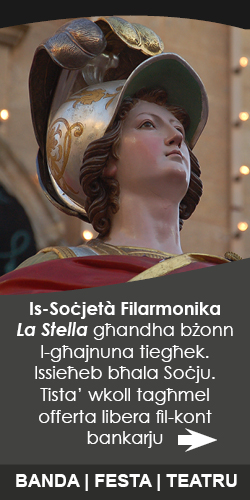A NIGHT AT THE OPERA
Giacomo Puccini’s magnificent masterpiece Turandot will open this year’s opera season at the Astra Theatre as it celebrates the 150th anniversary of the composer’s birth. Director/producer Mario Corradi, sopranos Francesca Patane’ and Miriam Cauchi sing Puccini’s praise to Veronica Stivala.
Outside the Forbidden City in Beijing, a Mandarin reads an edict: any prince seeking to marry the beautiful princess Turandot must answer three riddles. If he fails he loses his head. Thirty six princes have already lost their lives attempting to solve the riddles posed by the cold and cruel princess. Despite the fatalistic appearance of the quest, one ‘anonymous’ prince decides to brave solving the cold-blooded princess’s enigmas, ignoring all those around him who try to dissuade him from this foolish attempt.
Stage director Mario Corradi speaks Puccini’s 1926 opera with such fervent passion it makes one want to rush to see the opera to witness its splendour. "Giacomo Puccini’s Turandot is a masterpiece with so many layers that one single reading could never exhaust the wealth and richness in the opera" he enthuses. Turandot is a very complex opera in terms of physical staging – it calls for a huge orchestra and a huge chorus. Corradi explains how Turandot is the last of the great opera traditions in the Western world. It is the culmination of three centuries of opera writing. Fascinatingly it has within itself the entire tradition of the melodrama and at the same time is an open window on all the musical movements that were born in the 20th century.
The starting point for the director before he visually renders the opera and makes the story interesting for a contemporary audience is the pivotal character: Turandot.
Having addressed the issue as to whether she really is the cruel, whimsical and capricious princess of Gozzi fairytale, Mro Corradi underscores how she is more than that. Turandot is the story of a lady who is afraid of becoming a woman. She still feels the trauma of her great ancestors being raped and then murdered by a man. As a result, she sees the men as a symbol of violence and does not want to choose her future husband according to his physical strength, but according to his mental might.
Turandot’s chosen suitor will be he who can solve her three riddles. Accepting her challenge is a different kind of battle. The fact that all the princes who accept the challenge and lose their heads, is a consequence of their not being clever enough: if a man can’t use his head, then he doesn’t deserve to keep it. Mro Corradi cleverly points out how Puccini anitcipates Simone di Beavoir’s famous quote that "one is not born a woman, one becomes one". Turandot is exactly that, she has almost built a statue around herself in order to protect her virginity. It is Turandot’s character which inspired Mro Corradi to build the set which is an enormous golden head within the emperor stays. "Can you imagine an emperor accepting such law?" Mro Corradi points out. There isn’t any logic in this – Turandot is really the pivotal centre of the entire story.
Mro Corradi shares his clever insights on his interpretation of the opera: "I try not to fall into the trap of the usual interpretation of Turandot." He does take into consideration past productions of the opera. Although many interpretations that have been considered to be traditional are correct, many are, in his opinion, wrong. "For instance, tradition want the old Timur, who is Calaf (the anonymous prince)’s father, to be blind but there is no indication by Puccini that suggests so." Mro Corradi insists that there is "to extent that in the first encouter between father and son Calaf says: ‘Guardimi padre sono io’."
Renowned Italian soprano Francesca Patane’ is princess Turandot in the opera. She has played the character many times and though this may have its pitfalls, Patane’ is postive: " I’ve performed Turandot so many times and I don’t want to say it’s getting boring. Each time i try to find something new in the character." She explains how the role is not an easy one to play: To accentuate the more hysterical part of Turandot’s character, it would be tempting to overdo the drama. Patane’ always tries "to get the vulnerability and fragility of the woman out in some phrases when I can. As soon as I can, I try to get across the pianissimi and the soft sounds that make you understand that she’s not that bad."
Gozo-born soprano Miriam Cauchi’s character Liu serves as a contrast to Turandot. The slave girl is a symbol of love who selflessly gives up her life in order to defend the prince with whom she is in love. Independent of the fact that this love is not being reciprocated, there is a consistency that continues to the very end, to the extent that Liu decides to kill herself not to reveal the name of the prince."We want to deliver this contrast to the audience," Ms Cauchi explains: "Turandot is a cold person but through Liu she changes her mind and actually starts loving this prince."
The chorus will be in the hands of choir mistress Dr Maria Frendo. Prof. Joseph Vella is the musical director and will conduct the National Philharmonic Orchestra. Turandot is being staged at the Astra Theatre on Thursday and Saturday as part of the seventh edition of Festival Mediterranea.
Tickets can be bought through the Astra Theatre helpline: 2155 0985 or through email: [email protected]
Besides Turandot, this year’s edition of Festival Mediterranea is also presenting a month-long programme of events which started today and will end on Saturday 22nd November.



